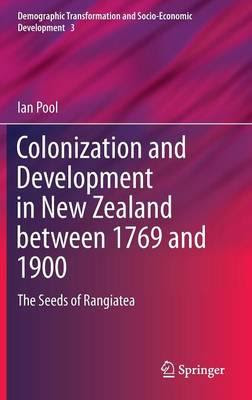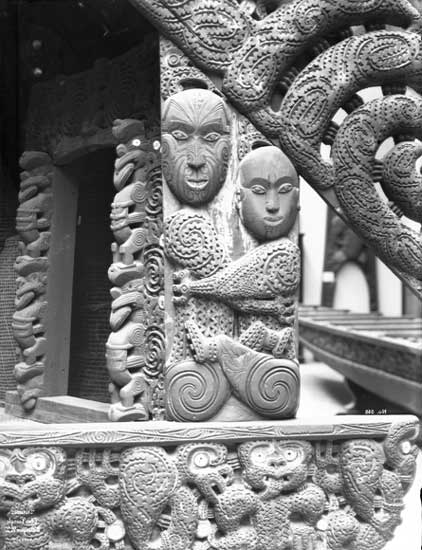Colonization and Development in New Zealand between 1769 and 1900: The Seeds of Rangiatea
Emeritus Professor Ian Pool of the National Institute of Demographic and Economic Analysis, University of Waikato, is an acclaimed demographer who has worked across Asia, Africa and the Pacific over many decades, including for the United Nations. Within New Zealand he is particularly known for his immense contribution to the demographic history of Māori. His work Te Iwi Maori: A New Zealand Population Past, Present, and Projected has been hugely influential since it was first published in 1991 and has been especially important in helping those of us interested in understanding the impact of colonisation on Māori to consider the demographic dimension to this story. Now, some two decades later, Professor Pool has returned to explore this theme, though with a wider focus on issues of development.
Colonization and Development in New Zealand between 1769 and 1900: The Seeds of Rangiatea is published by Springer, from whose website the following synopsis is taken.
This book details the interactions between the Seeds of Rangiatea, New Zealand’s Māori people of Polynesian origin, and Europe from 1769 to 1900. It provides a case-study of the way Imperial era contact and colonization negatively affected naturally evolving demographic/epidemiologic transitions and imposed economic conditions that thwarted development by precursor peoples, wherever European expansion occurred. In doing so, it questions the applicability of conventional models for analyses of colonial histories of population/health and of development.
The book focuses on, and synthesizes, the most critical parts of the story, the health and population trends, and the economic and social development of Māori. It adopts demographic methodologies, most typically used in developing countries, which allow the mapping of broad changes in Māori society, particularly their survival as a people.
The book raises general theoretical questions about how populations react to the introduction of diseases to which they have no natural immunity. Another more general theoretical issue is what happens when one society’s development processes are superseded by those of some more powerful force, whether an imperial power or a modern-day agency, which has ingrained ideas about objectives and strategies for development. Finally, it explores how health and development interact.
The Māori experience of contact and colonization, lasting from 1769 to circa 1900, narrated here, is an all too familiar story for many other territories and populations, Natives and former colonists. This book provides a case-study with wider ramifications for theory in colonial history, development studies, demography, anthropology and other fields.
Colonization and Development in New Zealand between 1769 and 1900: The Seeds of Rangiatea is published by Springer, from whose website the following synopsis is taken.
This book details the interactions between the Seeds of Rangiatea, New Zealand’s Māori people of Polynesian origin, and Europe from 1769 to 1900. It provides a case-study of the way Imperial era contact and colonization negatively affected naturally evolving demographic/epidemiologic transitions and imposed economic conditions that thwarted development by precursor peoples, wherever European expansion occurred. In doing so, it questions the applicability of conventional models for analyses of colonial histories of population/health and of development.
The book focuses on, and synthesizes, the most critical parts of the story, the health and population trends, and the economic and social development of Māori. It adopts demographic methodologies, most typically used in developing countries, which allow the mapping of broad changes in Māori society, particularly their survival as a people.
The book raises general theoretical questions about how populations react to the introduction of diseases to which they have no natural immunity. Another more general theoretical issue is what happens when one society’s development processes are superseded by those of some more powerful force, whether an imperial power or a modern-day agency, which has ingrained ideas about objectives and strategies for development. Finally, it explores how health and development interact.
The Māori experience of contact and colonization, lasting from 1769 to circa 1900, narrated here, is an all too familiar story for many other territories and populations, Natives and former colonists. This book provides a case-study with wider ramifications for theory in colonial history, development studies, demography, anthropology and other fields.




Comments
Post a Comment